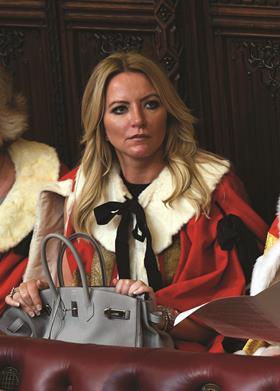On 1 October, Mrs Justice Cockerill DBE handed down the highly anticipated judgment in The Secretary of State for Health and Social Care v PPE Medpro [2025] EWHC 2486 (Comm). The case has garnered a great deal of attention from the press. This is mainly due to the now well-documented involvement of Baroness Michelle Mone (pictured) in the process of procuring the contract in question by using the government’s ‘VIP lane’ set up during the Covid-19 pandemic to try to cope with the massively increased demand for personal protective equipment (PPE). Mone is married to Doug Barrowman who, it has been established, heads up a consortium of companies of which Medpro is one.

Background and decision
The crux of the claim was whether the 25 million sterile surgical gowns provided to the Department of Health and Social Care (DHSC) by Medpro ordered at a cost of £122m were compliant with the terms set out in the contract. Upon inspection of the gowns when they arrived in the UK, DHSC decided that they were not compliant with the terms of the contract and rejected them. The case therefore concerned the questions of contract construction, sterility and sterility assurance, estoppel, the medical device regulations, rejection and the measure of damages.
The court found that there had been three breaches of contract:
(1) Medpro was in breach of the contractual requirement for the gowns to meet something known as a Sterility Assurance Level (SAL) of 10-6.
(2) Medpro had failed to comply with EN-556-1 (the relevant sterility standard). This standard required a validated process and SAL 10-6 which Medpro on its own case admitted it had not followed.
(3) Medpro failed to comply with CE marking (confirmation that a product meets EU standards): the contractual provisions relied upon by Medpro were insufficient to outweigh the other provisions in the contract which on their face required CE marking.
Insofar as estoppel is concerned, Medpro argued that it was entitled to rely on the concepts of estoppel by representation or convention or acquiescence, by virtue of the fact that DHSC had approved documents submitted by Medpro to evidence sterility, notwithstanding its failure to adhere to the contractual guidelines. The court rejected this position, finding that DHSC had not agreed that Medpro could prove its compliance with sterility requirements by another method.

As stated above, DHSC rejected the gowns (in December 2020), pursuant to inspection of them sometime after they had arrived in the UK. However, the court found that DHSC’s rejection of the gowns was not timely in that it would have been possible for its agent in China to have rejected them at that point.
DHSC’s claim for damages was limited to £128m, which included its claim for storage costs amounting to £8m. Interestingly, the judge found that DHSC’s claim for storage failed for want of evidence. This serves as a timely reminder that lawyers must ensure that they are in possession of the necessary underlying documentation in order to prove their client’s case. Insofar as mitigation is concerned, the court rejected Medpro’s argument that DHSC had failed to mitigate its loss by not finding an alternative buyer for the gowns. The gowns were intended solely for use by the NHS and the evidence provided showed that they could not be used in any other forum.
Accordingly, the judge found that DHSC was entitled to the full £122m and that Medpro should make that payment within 14 days.
Floodgates?
On the face of it, this result marks a significant win for a Labour government that has been open about its desire to recover as much taxpayer money as possible, money which it claims was misspent by the previous Conservative government under the ‘VIP lane’. However, the question of whether it will indeed recover the judgment debt remains to be seen. The day before the judgment was handed down, Medpro went into administration with assets of just £666,000. In the first instance, the administrators’ costs of pursuing the judgment debt will be paid using the assets of the business. In the alternative, those fees can be covered by any of the company’s creditors. Given that Medpro was a special purpose vehicle set up specifically for the contract in question, it must be assumed DHSC is the major creditor of the company.
DHSC will no doubt be working closely with its legal team to establish whether claims can be made against any of the directors of Medpro for mismanagement of company funds. Alternatively, as set out in an article by the BBC on 4 October 2025, a spokesperson for Barrowman has encouraged DHSC to pursue the other members of the consortium of which Medpro was one, since it is claimed that they received £83m in the funds received from DHSC (the other consortium companies have not taken the opportunity offered to comment publicly). However, as anyone who has ever been involved in such a process can attest, following the money and actually recovering it is often fraught with difficulty.
In June 2025, a government report estimated that failed Covid contracts cost the taxpayer £1.4bn. While it is clear that this case will be used as a benchmark for any future attempts by the government to recover these losses, each case will be judged on its own merits. What matters above all the bluster and press attention will be the judge’s application of the legal principles involved.
James Robertson is a litigation partner at Spector Constant & Williams






























No comments yet